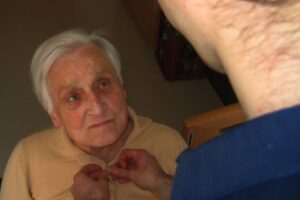In a previous article, we discussed the importance of recognizing symptoms of Lyme disease in seniors. We said Lyme disease can be difficult to diagnose, especially in seniors, as it can mirror dementia, as well as chronic fatigue syndrome, arthritis and more. Because it is common for seniors to report joint pain, muscle aches, fatigue and dizziness, doctors often feel that the symptoms may not be that out of the ordinary and miss a diagnosis. Knowing all this and advocating for testing is the first step. Next comes treatment.

Treat Lyme disease
If you see a tick on the skin of a senior in your care, document it. Be sure to note the date of the bite. Set up an auto-reminder to check the bite site each day for any irritation or other symptoms. (Lesions typically develop 7-10 days after a tick bite.) Having this information to share with your doctor can greatly help with diagnosis, even if you are able to bring the senior you care for to the doctor right away.
If you find a tick, follow these Centers for Disease Control and Prevention (CDC) recommendations for removal:
- Use fine-tipped tweezers to grasp the tick as close to the skin’s surface as possible.
- Pull upward with steady, even pressure. Don’t twist or jerk the tick; this can cause the mouth-parts to break off and remain in the skin. If this happens, remove the mouth-parts with tweezers. If you are unable to remove the mouth easily with clean tweezers, leave it alone and let the skin heal.
- After removing the tick, thoroughly clean the bite area and your hands with rubbing alcohol, an iodine scrub, or soap and water.
- Dispose of a live tick by submersing it in alcohol, placing it in a sealed bag/container, wrapping it tightly in tape, or flushing it down the toilet. Never crush a tick with your fingers.
Avoid folklore remedies such as “painting” the tick with nail polish or petroleum jelly, or using heat to make the tick detach from the skin. Your goal is to remove the tick as quickly as possible–not waiting for it to detach.
According to the CDC, “People treated with appropriate antibiotics in the early stages of Lyme disease usually recover rapidly and completely. Antibiotics commonly used for oral treatment include doxycycline, amoxicillin, or cefuroxime axetil. People with certain neurological or cardiac forms of illness may require intravenous treatment with antibiotics such as ceftriaxone or penicillin.”
The CDC also says, “These regimens are guidelines only and may need to be adjusted depending on a person’s age, medical history, underlying health conditions, pregnancy status, or allergies.”
 It’s important to note that the immune system deteriorates as we get older. Therefore, seniors usually respond slower to treatment, which increases risk of the disease becoming worse, especially if diagnosis and timely treatment were delayed. Lyme disease not cured by antibiotics becomes increasingly difficult for doctors to counter and can become fatal. Prevention is the best defense against Lyme disease.
It’s important to note that the immune system deteriorates as we get older. Therefore, seniors usually respond slower to treatment, which increases risk of the disease becoming worse, especially if diagnosis and timely treatment were delayed. Lyme disease not cured by antibiotics becomes increasingly difficult for doctors to counter and can become fatal. Prevention is the best defense against Lyme disease.
Prevent Lyme disease
Lyme disease cases are concentrated in the Northeast and upper Midwest, with 14 states accounting for over 96% of cases reported to CDC.
The CDC reports that more than 329,000 people are likely to contract Lyme disease every year in the U.S. alone. This estimated number of annual infections is 1.5 times the number of women diagnosed with breast cancer, and six times the number of people diagnosed with HIV/AIDS each year in the US. Lyme disease accounts for more than 90% of all reported cases of diseases carried by animals (vector-borne illness). But only one in ten cases of Lyme are reported, since many clinicians are not looking for Lyme disease specifically.
As ticks continue to migrate to more and more areas, we can expect cases to continue to rise. This makes prevention all the more difficult and important, especially for seniors who are more vulnerable to symptoms.
Here are some ideas to keep ticks away:
- Avoid wooded areas with high grass or brush.
- Keep grass cut in and around the yard.
- Wear long sleeves and long pants, and tuck pant legs into socks when in tick territory.
- Use bug repellent on exposed skin and clothing. Ask a medical professional for an option that is safe for the senior in your care.
- Carefully inspect yourself and the senior in your care for ticks after being out in a natural setting.
- Treat pets that can bring ticks inside. Ask a vet for safe options.
The CDC and the Lyme Disease Association offer a wealth of information about symptoms and prevention, as well as patient support resources. Learn as much as possible, and if you suspect the senior in your care has been exposed to environments that harbor ticks, consult a medical professional right away.
This post is sponsored by Home Instead Senior Care serving Prince William and Fauquier counties.



